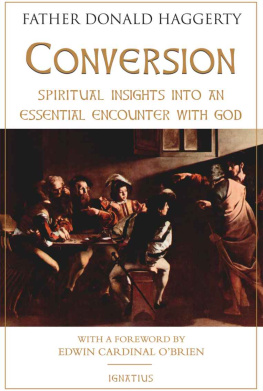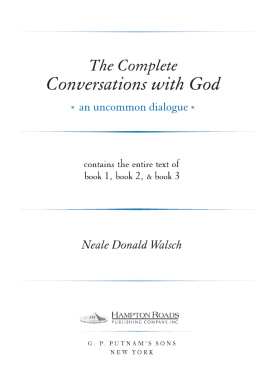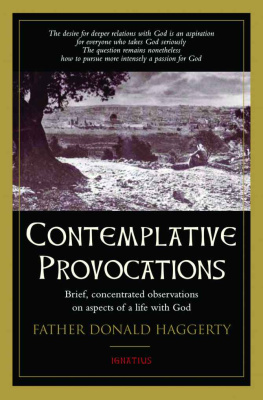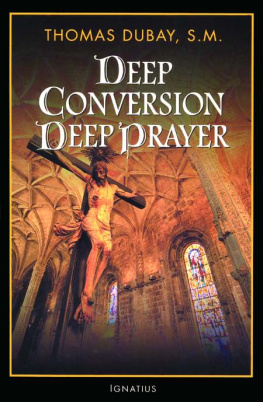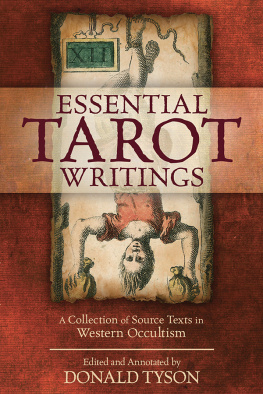Fr. Donald Haggerty - Conversion : spiritual insights into an essential encounter with God
Here you can read online Fr. Donald Haggerty - Conversion : spiritual insights into an essential encounter with God full text of the book (entire story) in english for free. Download pdf and epub, get meaning, cover and reviews about this ebook. year: 2017, genre: Religion. Description of the work, (preface) as well as reviews are available. Best literature library LitArk.com created for fans of good reading and offers a wide selection of genres:
Romance novel
Science fiction
Adventure
Detective
Science
History
Home and family
Prose
Art
Politics
Computer
Non-fiction
Religion
Business
Children
Humor
Choose a favorite category and find really read worthwhile books. Enjoy immersion in the world of imagination, feel the emotions of the characters or learn something new for yourself, make an fascinating discovery.
- Book:Conversion : spiritual insights into an essential encounter with God
- Author:
- Genre:
- Year:2017
- Rating:4 / 5
- Favourites:Add to favourites
- Your mark:
- 80
- 1
- 2
- 3
- 4
- 5
Conversion : spiritual insights into an essential encounter with God: summary, description and annotation
We offer to read an annotation, description, summary or preface (depends on what the author of the book "Conversion : spiritual insights into an essential encounter with God" wrote himself). If you haven't found the necessary information about the book — write in the comments, we will try to find it.
Conversion : spiritual insights into an essential encounter with God — read online for free the complete book (whole text) full work
Below is the text of the book, divided by pages. System saving the place of the last page read, allows you to conveniently read the book "Conversion : spiritual insights into an essential encounter with God" online for free, without having to search again every time where you left off. Put a bookmark, and you can go to the page where you finished reading at any time.
Font size:
Interval:
Bookmark:
Conversion
FATHER DONALD HAGGERTY
Spiritual Insights into an
Essential Encounter with God
IGNATIUS PRESS SAN FRANCISCO
Cover art:
The Calling of Saint Matthew
Michelangelo Merisi da Caravaggio
Cover design by Roxanne Mei Lum
2017 by Ignatius Press, San Francisco
All rights reserved
ISBN 978-1-62164-211-4 (PB)
ISBN 978-1-68149-777-8 (EB)
Library of Congress Control Number 2017941802
Printed in the United States of America
To
Sister M. Delphinus, M.C.
and
Sister M. Renato, M.C. (19692005)
Though relatively brief in length, Father Donald Haggertys Conversion offers an in-depth exploration into the spiritual / ascetical basis for serious growth in Christ. On every page, laymen and clergy alike are invited to draw closer to Jesus by dying to self in a lifelong series of yeses that yield an ongoing inner transformation or conversion experience. Father Haggertys familiarity with the great conversion stories of our Catholic traditionSaint Augustine, Saint Francis of Assisi, Saint Ignatius of Loyolais evident, but it is his synthesis of their stories, developed throughout his twenty-five years as confessor, spiritual director, seminary formatter, and retreat master that offers the serious reader penetrating and challenging insights into our spiritual journey.
Solid growth in the spiritual life is fleeting and illusory unless it is rooted and lived out in the suffering and death of Christ on the Cross. Thus, while Gods lavish mercy is limitless, it does not come without the cost of permanent and painful changes in life. Satan is at work in a feel-good faith that promises paradise to one and all without the struggle for radical conversion in our lives. The role of the Blessed Mother in this process of converting souls for her Son is highlighted in rich detail in this book. Those who have known her loving and merciful intervention in their lives tend to become people who honor her desire that we seek souls for her Son.
In addressing the clergy, what the author calls cerebral orthodoxy and bourgeois clerical life is bravely exposed as a betrayal of the call to follow Christ in his invitation to drink the chalice that I drink and to renounce worldly attractions for the sake of the Kingdom. Likewise, for lay people, there are provocative reflections to ponder as the Lord is sought more fully after a conversion experience. Ordinary events in the life of every Christian are intimately involved in Gods eternal design, a God who frequently uses unexpected events and unlikely encounters in bringing about the graces of conversion. The converted soul often becomes the instrument used by God for the conversion of other souls.
This is not a work for casual or light reading. It demands meditative moments, honest and prayerful self-reflection, and, most of all, a sincere desire to know Christ and his truth ever more deeply as we pursue the path toward the lofty goal of genuine gospel discipleship proposed by Father Haggerty. May this timely book be a means of grace in many lives.
Edwin F. Cardinal OBrien
June 15, 2017
Solemnity of Corpus Christi
Saint Edith Stein
At a side altar in the Church of San Luigi dei Francesi in Rome is a magnificent Caravaggio painting depicting the call of Saint Matthew the tax collector. A young rakish Matthew in his twenties sits slumped over a table surrounded by some friends and associates. His head is bent downward, and his eyes are downcast and staring. One hand dangles feebly near the scattered coins in front of him. Jesus stands a few feet before Matthew at the other side of the table, with a piercing gaze cast upon him. Behind Jesus, a strong beam of light shines into the room from the doorway. Jesus arm is horizontally raised across the table, and a single finger of his outstretched hand points directly toward Matthew. The other figures in the scene are all aware that Matthew alone has been signaled. Matthews discomfort, his desire to disappear with no place to hide, is all too clear. The painting captures wonderfully a mans soul confronting its hour of truth. Caravaggio takes us inside that long, dreadful instant of painful uncertainty when a decision must be made for or against Jesus Christ, the crossroad that will mark a lifetime depending on a souls choice.
This centrality of conversion is striking throughout the four Gospels. There are a number of variations on the theme. The call to abandon a previous life, dropping everything at once to follow Our Lord on an itinerant, unknown journey, is the summons heard by Peter and Andrew, James and John, at the Sea of Galilee. A conversion in this case does not mean that a bad life has been left behind, a parting with evil ways. The conversion here involves a radical yes of personal fidelity to Jesus. The act overturns everything familiar and instantly attaches a life in a unique bond with Jesus Christ. The apostles all underwent such a conversion. The response did not make them immediate heroes or full of wisdom, zeal, and courage. It did place them for the next three years in constant proximity to Jesus. That closeness to him allowed the drawing power of his attraction to permeate their souls. Every person who goes far in a love for God and for souls will experience a similar pattern. The effect of following Our Lord after a very decisive choice for him, staying close to him especially in prayer, permits his presence to deepen its personal impact upon our life. A lifetime of spiritual need for God has its seeds in this initial period of conversion.
There are as well in the Gospels the conversions of more gravely sinful persons. The sinful woman described in Saint Lukes seventh chapter may have been Saint Mary Magdalen, who is mentioned by name in the next verses of chapter eight. In the home of a Pharisee, at a dinner party, this woman prostrates herself behind the feet of Jesus, pouring out her tears and perfume on the feet of Our Lord, kissing his feet and drying them with her hair. The Pharisee hosting this dinner is offended by the display and murmurs inwardly. Jesus already knows the repentance of this woman for her many sins. In fact, this hour may not be their first encounter. It is not inconceivable that she is the woman caught in adultery in Johns eighth chapter whom he saved from stoning. Jesus reply to Simon the Pharisee should be carved into every Christian heart. Therefore, I tell you, her sins, which were many, have been forgiven; hence she has shown great love. But the one to whom little is forgiven, loves little (Lk 7:47; NRS). These words are essential to every deeper understanding of relations with God. Divine mercy is an extraordinary gift when great sins have marred a life. But Gods mercy is not intended simply for the forgiveness of sin. It is meant for the sake of a life that will stretch ever farther after a conversion in an intensity of love. The Lord who on an earlier day rescued us deserves nothing less than a life of great love in gratitude to him.
There is another type of conversion anticipated in certain Gospel scenes, and this, too, is worthy of our pondering. Jesus offers challenges in the Gospel that will take time before they are understood in their deeper significance. When James and John requested seats on the right and left of Our Lord in his kingdom, they were told that they did not know what they were asking. Are you able to drink the chalice that I drink? (Mk 10:38). This form of conversion is always linked to some greater insight into the Passion of Christ. We realize that the Passion of Christ has entered mysteriously into our own life as a questionhow far we are willing to go in love for him? The admonition that we must die to self for greater love is not just a spiritual metaphor. In fact, it is a direct challenge issued on the night before Jesus own crucifixion. Will you lay down your life for me? (Jn 13:38). To the degree we seek God with more intense love, we are on a path of confrontation with this question of dying for love of Christ. At some point long after an initial conversion, another leap of soul is necessary. A decisive yes to Our Lord is demanded, as it was earlier in life, but from a deeper layer of soul, overcoming any barrier of hesitation. Spiritual conversions of this kind may be the most important acts in our life. Crossing a threshold to an interior offering of all to God can lead to the gift of our entire life to him. Every saint in the course of a life underwent conversions of this type.
Next pageFont size:
Interval:
Bookmark:
Similar books «Conversion : spiritual insights into an essential encounter with God»
Look at similar books to Conversion : spiritual insights into an essential encounter with God. We have selected literature similar in name and meaning in the hope of providing readers with more options to find new, interesting, not yet read works.
Discussion, reviews of the book Conversion : spiritual insights into an essential encounter with God and just readers' own opinions. Leave your comments, write what you think about the work, its meaning or the main characters. Specify what exactly you liked and what you didn't like, and why you think so.

